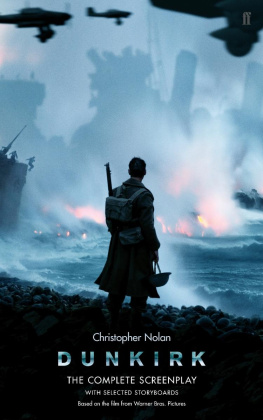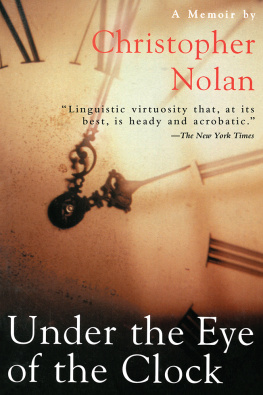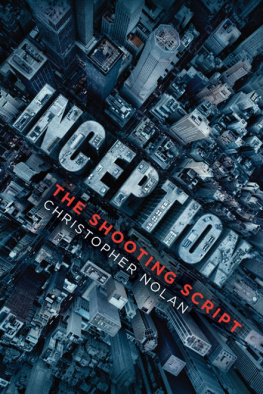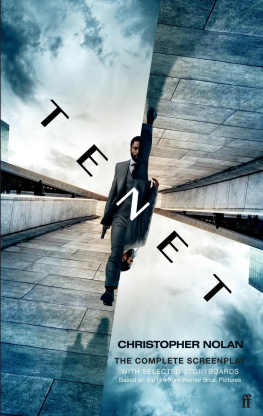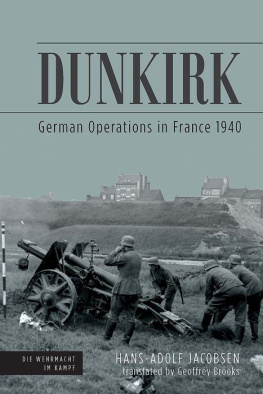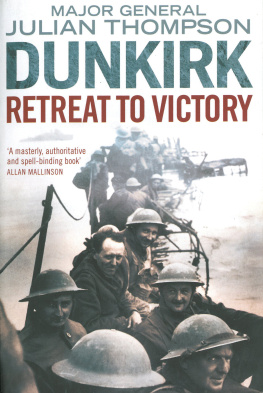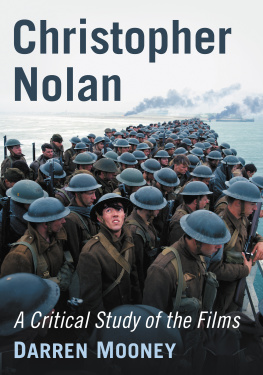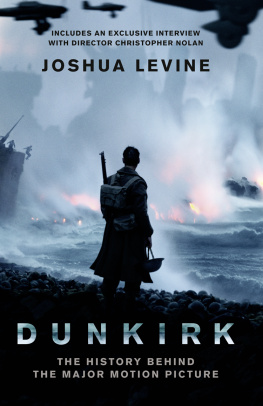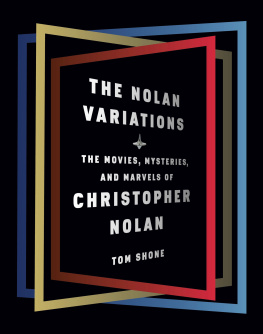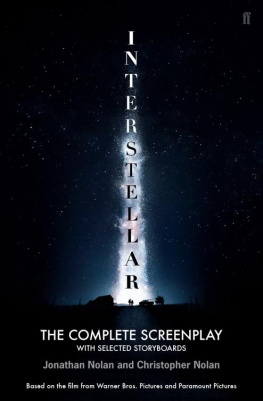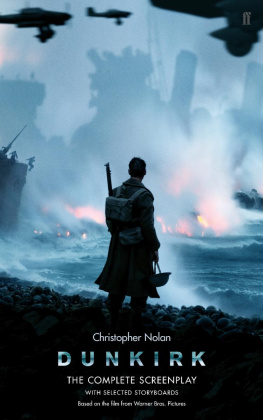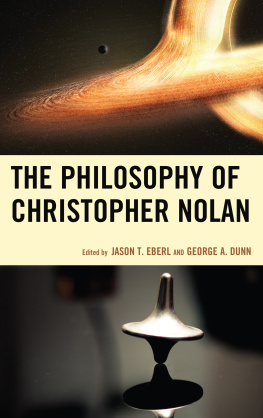A conversation between
Christopher Nolan and Jonathan Nolan
JONATHAN NOLAN What made you want to make a war movie?
CHRISTOPHER NOLAN I never wanted to make a war movie. In a funny sort of way, I dont see Dunkirk as a war movie at all. I think the reason I was drawn to the story of Dunkirk is because its a survival story. I wouldnt feel comfortable doing what I consider to be a war movie, never having fought in a war.
You always feel a bit fraudulent as a filmmaker. I would feel truly fraudulent. Whereas a survival story, I can tap into that emotion. Dunkirk as a survival story, as a sort of ticking-clock suspense story, I feel confident and comfortable taking that on. I dont know how people who havent been in a war take on a war movie. I think that would be daunting.
JONATHAN Well, theyd probably find their way back to the original material. Youd find someone whos written on the topic, who connects you to it, I guess. As a writer, you pride yourself on being able to imagine yourself in situations, but this does feel like the one that is maybe beyond the bounds.
CHRISTOPHER The last time I looked at The Thin Red Line on Bluray its a favorite movie of mine, as you know and included in the Criterion Edition is an essay by James Jones who wrote the novel. Hes talking about war movies and he just shreds them all.
JONATHAN (Laughter.)
CHRISTOPHER I mean, literally just shreds them. He basically says, since All Quiet on the Western Front, what has there been to say about war? That war turns men into animals; the longer theyre in it, the more they turn into animals. Thats it, thats all there is to say about it. He then goes through all the different story models such as the benevolent sergeant; he goes through all the things and just shreds them, as someone whos been in war. I found what he said quite sobering because I was about to start writing the script. It really spoke to things that Ive worried about. Youve got to talk to people who were really in it, whove been through these things.
JONATHAN Did you spend a lot of time doing research and talking to people?
CHRISTOPHER I did a lot of reading of first-hand accounts. And partly inspired by James Jones, I then watched All Quiet on the Western Front, which I dont think Id ever seen.
JONATHAN I havent seen it.
CHRISTOPHER They did a silent version and then they also released a sound version, because its right on the transition from silent cinema. Id seen bits of it when I was a kid. Its got these amazing camera moves of the silent era, before it all became very static, but it does have sound. And its absolutely relentless. Theyve got a shelling scene where theyre in the trenches and it just goes on so much longer than you can imagine, more than you can take. And, when I got to the end, I was like, wow, this pretty much says it all as far as the horror of war goes. And theres a nod to that film at the beginning of Dunkirk with Gibson taking the boots off the body, and then tying his boots theres a whole thing about boots in All Quiet on the Western Front.
JONATHAN Right.
CHRISTOPHER I moved on from there and said, okay, I really have to address this as a survival story, something that I can tap into and relate to. And thats why the enemy is unseen. I try to get across the experience that I got from reading first-hand accounts the point of view of somebody on the beach, who didnt really see the enemy very much. Theyre threatened by the planes, theyre threatened by the bombs and the unknown enemy, which I think is terrifying.
JONATHAN At what point in the process did that idea occur the idea that you would never see the enemy, not until the last shot, out of focus. You would feel them. Im trying to remember, when I watched the movie for the first time, if I even noticed, because the tension is so effective.
CHRISTOPHER People tend not to, actually.
JONATHAN Yeah, you had to point it out to me, which I thought was great. At what point when you were writing the script did you decide, or was it more organic?
CHRISTOPHER I honestly cant remember. I clearly must have decided. I remember deciding very clearly that I didnt want the generals in the rooms, I didnt want Churchill, I didnt want maps, I didnt want too much knowledge. I found this way of having them overhear some knowledge, from the guys on the mole. It was sort of an attempt to give you just enough that you understand whats going on but not too much, so you only have the level of knowledge of the soldier. I remember deciding that because I was looking at films like A Bridge Too Far, which is such a brilliant film.
JONATHAN A great film.
CHRISTOPHER But every time they cut to the generals in the rooms, I lose interest. Im seeing the German High Command, Im seeing the Luftwaffe. It takes me out of the experience.
JONATHAN It also suggests a level of sort of omniscience and awareness for those people that wasnt accurate to what is actually happening.
CHRISTOPHER Exactly. And it dated the films, because there was a particular way that those World War Two films were made when we were kids. Actually, they were made before we were kids, but they were the ones we grew up with, watching them on TV on Sunday. All these movies had a particular formula that involved the higher-up generals theres a version of that in contemporary cinema: the control room with all the monitors and everything. But its not even quite as codified in the same way. There was a real rhythm of youre in it a cinematic rhythm and then you get pulled out of it to the kind of higher-ups drinking champagne in the Schloss and talking about whatever. And it dates the films, theyre hard to relate to now. Just as a rhythm. What Im interested in in movies right now is where movies are firing on all cylinders the subjective experience going through it.
JONATHAN Trapping you.
CHRISTOPHER So I think not seeing the Germans evolved naturally out of that. But the thing that I do remember is in the dialogue and in the text and in the cards and stuff to begin with, there was much talking about Nazis, the characters were always talking about Nazis, reminding the contemporary audience how awful this conflict was, how evil the bad guys were.
JONATHAN Right.
CHRISTOPHER When Mark Rylance read the script I wanted him to play Dawson I had told him this whole thing about not seeing the enemy, they could be aliens, they could be anybody, you know. This is about survival. And when he read the script he pointed out that it referred to the Germans seventeen times he counted them. And he said, Doesnt that fight what youre trying to do? And I thought, yeah, maybe hes right. Ill try removing all of those references. And, I preferred it. It made more sense, you know, using the word enemy instead of using the word Germans. It made it more obvious, in a good way, what we were doing. As in, not showing the Germans, you know?

